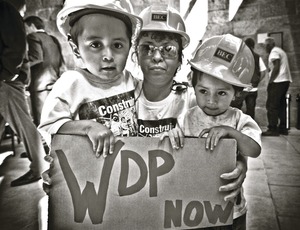Standing Up for Workers Who Have Been Exploited


Cristina Tzintzún, executive director of the 12-year-old Workers Defense Project (WDP), is making progress in her uphill battle to improve working conditions and pay for very low-income workers in Texas, most of them involved in construction and many of them undocumented immigrants.
"I think we fill a gap," Tzintzún says of the WDP, explaining that the workers the Austin-based organization fights for typically have no other advocate and, often, nowhere else to turn.
Among other things, the WDP has highlighted worker-safety issues, resulting in stepped-up enforcement by the Occupational Safety & Health Administration; lobbied to enact a strong state wage-theft law; won changes in contracts to provide for basic safety training and paid breaks; and, project by project, fought for higher minimum wages.
 |
| Tzintzún |
While Tzintzún's focus is on improving safety conditions and pay for low-income, often undocumented workers, an important side benefit is a more level playing field among contractors competing for new projects. When unscrupulous contractors "cut corners" on worker safety and pay, she says, "it makes it hard for contractors who play by the rules to compete."
The WDP is not afraid of the spotlight. Once, to draw attention to the number of Texas construction workers who die on the job each year, its members carried more than 100 black-painted coffins to the state capitol. WDP members also show up in force at jobsites and at city council meetings, often with placards that read, "We build Texas. We deserve better!"
Tzintzún and her group have won the respect of many in the construction industry. "The Workers Defense Project has been a great benefit," says Shayne Stevens, Texas regional safety manager at Rosendin Electric, the largest privately held electrical contractor in the U.S. Tzintzún and her group "help ensure safe working conditions and fair pay," he says.





